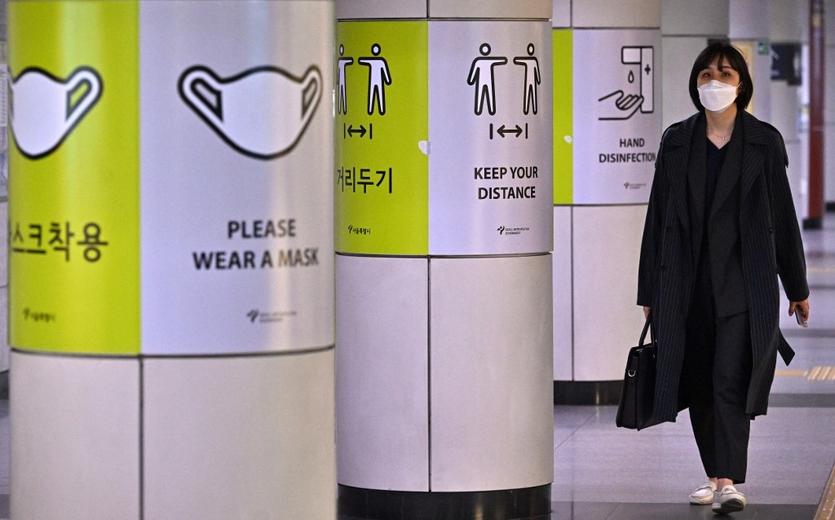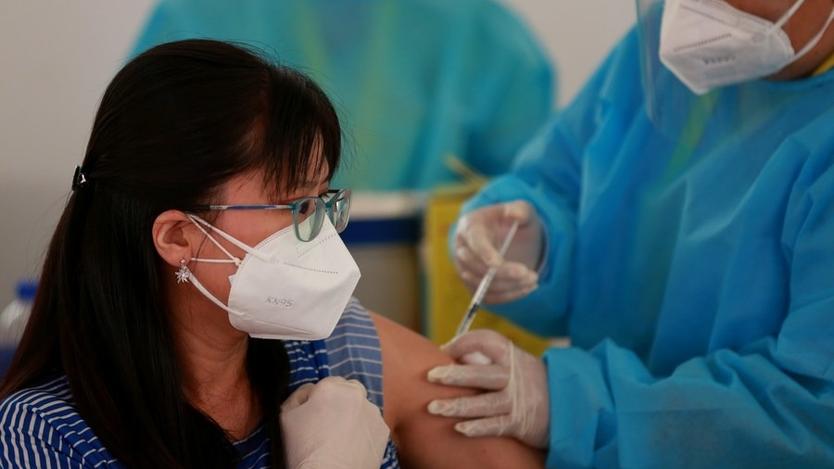 A woman walks past posters showing precautions against the COVID-19 coronavirus at a subway station in Seoul on April 15, 2022. (JUNG YEON-JE / AFP)
A woman walks past posters showing precautions against the COVID-19 coronavirus at a subway station in Seoul on April 15, 2022. (JUNG YEON-JE / AFP)
SEOUL / MANILA / YANGON / WELLINGTON - South Korea has loosened rules requiring masks to be worn outdoors as COVID-19 cases drop, but many people are not taking them off yet due to pervasive Omicron infections.
Most people were seen wearing masks on the bustling streets in Gwanghwamun district, where government and corporate buildings are located, saying the protection makes them feel more at ease.
"I tried taking it off when I left home but then 70-80 percent of people I saw downtown were wearing it. I guess it's too early to get rid of it even when we're outside," Lee Byung-young, 61, told Reuters.
Kim Eun-hee, 52, said she would feel safer without a mask if daily infections fall further to about 5,000.
The Korea Disease Control and Prevention Agency (KDCA) reported 20,084 new COVID-19 cases for Sunday, with daily cases continuing to drop from a peak of more than 620,000 in mid-March.
People are still required to wear masks indoors, and at outdoor events with 50 attendants or more, such as at rallies, concerts and sports stadiums.
The country of 52 million people has managed to limit its total case load to 17,295,733 with 22,958 deaths, through aggressive tracing and testing as well as widespread vaccination.
India
India's COVID-19 tally rose to 43,084,913 on Tuesday, as 2,568 new cases were registered during the past 24 hours across the country, showed the federal health ministry's latest data.
Nearly 42 percent of the new cases were reported from Delhi, which has 5,744 active cases at present.
Meanwhile, 20 new deaths were reported across the country since Monday morning, taking the total death toll to 523,889.
 A woman receives a shot of China's Sinopharm COVID-19 vaccine in Yangon, Myanmar, Aug 29, 2021. (PHOTO / XINHUA)
A woman receives a shot of China's Sinopharm COVID-19 vaccine in Yangon, Myanmar, Aug 29, 2021. (PHOTO / XINHUA)
Myanmar
Myanmar's Ministry of Health on Sunday lifted the quarantine requirement for fully vaccinated travelers who test negative for COVID-19 in a rapid test at the Yangon International Airport.
The rapid diagnostic test (RDT) for COVID-19 at the airport costs 15,000 kyats per testing for travelers, and the result comes within an hour, the health ministry said.
All foreign travelers entering the country before Sunday have to wait in quarantine at designated hotels for about 24 hours for the RT-PCR (polymerase chain reaction) test result.
All travelers entering the country until now are still obliged to present both a certificate of vaccination completed at least 14 days before arrival and a negative result in an RT-PCR performed within 72 hours of their arrival.
All foreign travelers are still required to submit COVID-19 medical insurance purchased from Myanma Insurance and a health declaration form, the ministry said.
The health ministry also shortened the quarantine period for the travelers entering the country with relief flights and through land border gates, from five days to three days for fully vaccinated travelers and from seven days to five days for those who are not fully vaccinated.
Myanmar's health ministry said it has lifted and shortened the quarantine periods as the COVID-19 positivity rate of incoming tourists was very low.
New Zealand
New Zealand has recorded 9,109 new community cases of COVID-19, the Ministry of Health said in a statement on Tuesday.
Among the new community infections, 2,678 were reported in the largest city Auckland, said the ministry.
In addition, 128 new cases of COVID-19 were detected at the New Zealand border.
Currently, there are 481 COVID-19 patients being treated in New Zealand hospitals, including 10 people in intensive care units or high dependency units. The ministry also reported 20 more deaths from COVID-19.
 A child receives the Pfizer-BioNtech COVID-19 vaccine for children aged 5-11 as a performer dressed as superhero character Spider-Man looks on at a gym in San Juan City, suburban Manila on Feb 7, 2022. (TED ALJIBE / AFP)
A child receives the Pfizer-BioNtech COVID-19 vaccine for children aged 5-11 as a performer dressed as superhero character Spider-Man looks on at a gym in San Juan City, suburban Manila on Feb 7, 2022. (TED ALJIBE / AFP)
Philippines
The Philippines is considering donating to Myanmar five million doses of Sputnik V COVID-19 vaccine, a senior health official said on Monday.
The donation would be the first by the Philippines to another nation, after it scrambled for much of last year to procure vaccines for its 110 million population.
Health officials have said the Philippines now has ample supplies.
Authorities are seeking clearance to donate the Russian vaccines through the Myanmar Red Cross Society, health undersecretary Maria Rosario Vergeire told a regular news conference.


